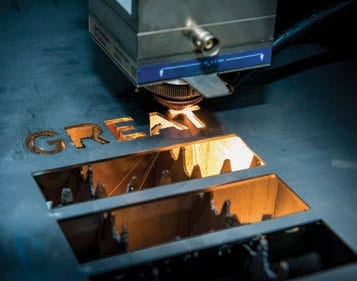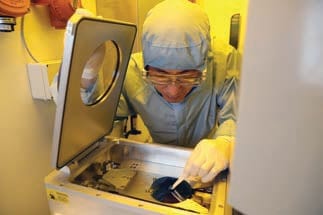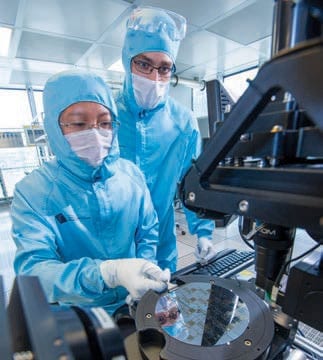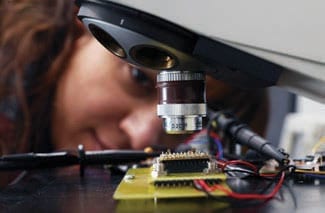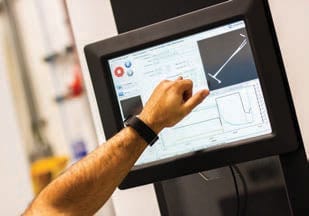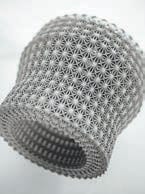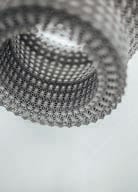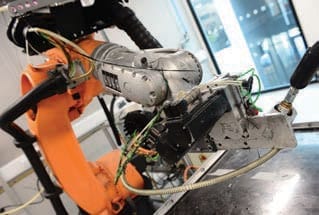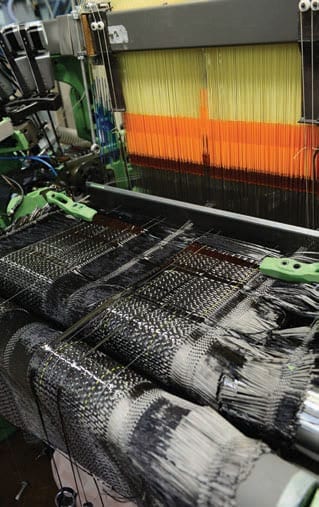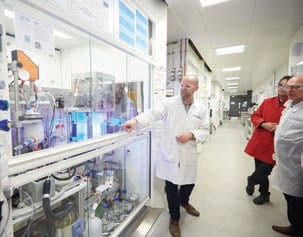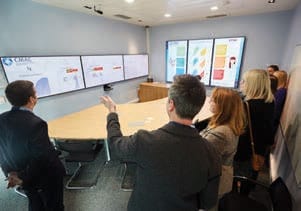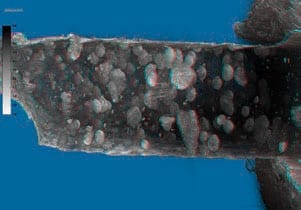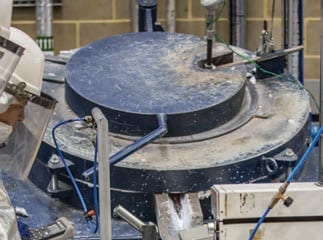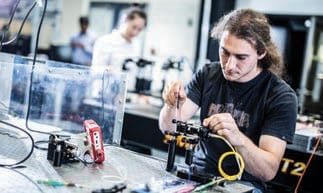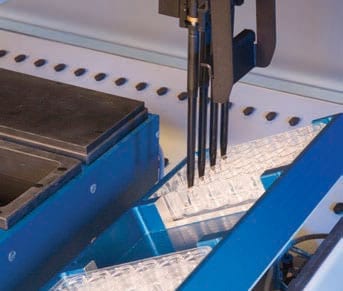THE FUTURE PHOTONICS HUB
Southampton targets end-user industries with practical applications.
Our research across four key Technology Platforms in 2018 focused on responding to specific industry needs. Much progress was achieved and some important outcomes are already emerging, including:
- building high channel count multicore optical fibres with a view to undertaking data transmission experiments with an industrial partner in 2019;
- the integration of mid-infrared emitters and detectors on a silicon/ germanium photonics platform;
- developing 2D materials on flexible substrates;
- developing quantum dot lasers by the industrially-compatible process of metal organic vapour phase epitaxy and opening up the possibility of low power quantum dot lasers for sensing applications.
2019
The forthcoming year will see the Hub deepen its connections with prospective collaborators by targeting photonics end-user industries such as aerospace, automotive and security, sectors which responded with particular promise to our 2018 industrial engagement activities.
THE FUTURE COMPOUND SEMICONDUCTOR (CS) MANUFACTURING HUB
FROM WAFERS TO SYSTEMS: BLAZING THE TRAIL TO 5G
The CS Hub (http://compoundsemiconductorhub.org/; @FutureCSHub) has had an exciting 2018, working towards our goal of establishing the UK as the global centre for CS research and manufacturing. We have developed the CS Cluster (www.csfusion.org) with our partners, a venture which connects CS manufacturing from research to product, and from wafers to systems.
The team has pushed forward science supporting 5G communications and imaging, including establishing basic RF GaN-Si HFET technology, developing new patented growth of µLED arrays and excellent progress on magnetic imaging systems. We have delivered professional development training on Photonics and GaN Electronics Technology to industry. Investment has improved our facilities, and we welcomed 13 new industrial partners during 2018.
[Looking forward into 2019] We will push forward the performance of compound semiconductor electronic and photonic structures grown on Si and develop additional links with industry partners. Research will include development of fast-fab (for rapid feedback on CS device performance) and GaN MMIC processes, optoelectronic devices for harsh environments and high performance IR detectors for use in applications such as surveillance.
MAPP (MANUFACTURE USING ADVANCED POWDERS AND PROCESSES) HUB
FAST and furious: Additive Manufacturing picks up speed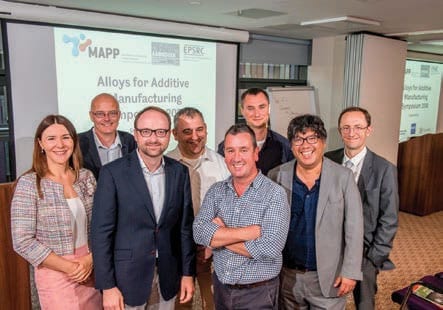
Research highlights during 2018 include work on in-situ process monitoring at the Diamond Light Source, which is uncovering new understanding about the fundamental physics of additive manufacturing (AM), and progress on Diode Area Melting, a new approach to AM with higher processing speeds. We have also seen successful developments in the rapidly-moving areas of Field Assisted Sintering Technology (FAST) technology, and the processing of ceramics from powder starting materials.
MAPP hosted a number of successful events in 2018, attracting international delegates from industry and academia. Our first international conference in January attracted 180 delegates, with representatives from over 35 companies and 20 universities, and we hosted the 3rd Alloys for Additive Manufacturing Symposium in September, with more than 100 delegates.
In 2019 we look forward to hosting a number of events to showcase our research with industry partners, and to starting several closely-aligned projects that have been recently funded by the Aerospace Technology Institute and Innovate UK. These projects will see us taking forward some of the early work from the Hub through to real world application with our industry partners.
FUTURE COMPOSITES MANUFACTURING RESEARCH HUB
Reinforcing Material Progress
The EPSRC is investing £10.3 million over seven years in the Future Composites Manufacturing Research Hub, which is led by Nottingham and Bristol universities. Cranfield; Imperial College; Manchester; Southampton; Cambridge; Edinburgh; Glasgow; and Brunel form the ‘spokes’.
The Hub will support collaboration in the UK engineering and sciences academic community to advance production technologies of fibre reinforced polymer matrix composites. It is linked closely to the National Composites Centre and the High Value Manufacturing Catapult and is supported by leading industrial partners from the composites sectors.
Its five priorities are: High rate deposition and rapid processing technologies; Design for manufacture via validated simulation; Manufacturing for multifunctional composites and integrated structures; Inspection and in-process evaluation; Recycling and re-use.
Three ongoing Core Projects are developing technologies in manufacturing techniques for optimised fibre architectures; multifunctional composites for structural applications; and automated dry fibre placement. Six Feasibility Studies based on themes of characterisation and simulation of textile and sandwich forming, resin curing and infusion were completed in 2018.
Outreach activities included a free-toattend Open Day in July, preceding the 11th International Conference on Manufacturing of Advanced Composites (ICMAC 2018) at the University of Nottingham. The Hub hosted a stand and a presentation session at the Advanced Engineering Show at the NEC, Birmingham in November, and will do so again in 2019. It also attended the UK/US Composites Materials Expert Mission in October, organised by Innovate UK.
A second round of Core projects will start in 2019 and four new Feasibility Studies are scheduled to be announced in January.
EPSRC Future Continuous Manufacturing and Advanced Crystallisation Research Hub (CMAC)
TAKING DISEASE PERSONALLY
The CMAC collaborative programme, led by the University of Strathclyde, seeks to transform the way that medicines are developed and made. Our growing portfolio of radical developments will accelerate the pace at which new chemical entities can be transformed into safe, effective, high quality and increasingly personalised products.
Our manufacturing research program has made significant progress that over the last 12 months, especially in developing Digital Twins for the predictive design of particles, products and processes and in the design and operation of modular, integrated
Microfactory platforms to enable future supply chains. The development of digital design and digital manufacturing technologies underpins this progress, as highlighted in the recent government Made Smarter report. Examples and case studies cover the vibrant program of research projects across CMAC partners, as well as the steps being made to translate these into industry practice.
For 2019, we are excited at how new EPSRC awards will help to extend this progress, specifically for the application of Artificial Intelligence and AR/VR technologies to continuous manufacturing. In addition to our ambitious manufacturing research programme and technical translation activities, our ongoing training initiatives are driving the progress our talented trainees and researchers are making and the latest developments in CMAC’s world class facilities. We look forward to continuing to work with all our colleagues as we strive to place the UK at the forefront of advanced pharmaceutical manufacturing.
LIME (LIQUID METAL ENGINEERING)
Closing the Loop with Light Metal Alloys
2018
The Future LiME (Liquid Metal Engineering) Hub is focused on development and discovery to achieve the overarching vision of closed-loop recycling. In 2018, there has been significant development in new light metal alloys for closed-loop recycling with direct industrial relevance. Our heterogenous nucleation theory that underpins the scientific understating of the Hub has continued to grow. The Hub has also had extensive success with the Melt Conditioning Direct Chill (MC-DC) technology, with full application into industry.
The Advanced Metal Processing Centre (AMPC) was officially launched in June, ready to further develop the fundamental research and technological innovation from the Hub that has been mapped to the Technology Readiness Levels (TRLs). In addition, the Hub also hosted the major International Magnesium 2018 conference on Magnesium Alloys and Their Applications.
FUTURE METROLOGY HUB
Measured Progress
2018
The Future Metrology Hub, which is led by the University of Huddersfield, has made excellent progress on our core research programme during 2018, making significant developments in embedded metrology systems, metrology informatics and category ontology semantic systems. In addition, the Hub has also been working to develop the metrology community within the UK both in industry and academia. Through our first research feasibility call we have funded new projects in four universities. We have also established the Industrial Metrology Forum, an annual event to bring industry and academia together to identify areas for collaboration and translate research outputs into practical solutions to industrial challenges.
Looking forward to 2019 In 2019 we will hold our first Early Career Researcher Symposium, bringing researchers from the Hub, Spokes and feasibility call projects together to present their work, discuss ideas for future project and develop skills which will benefit them throughout their careers. We will also continue to build our links with industry.
MANUFACTURING FOR THE FUTURE HUB IN TARGETED HEALTHCARE
Proof of Concept Moves into Industry
2018
This has been an incredibly busy and successful year. Our experimental programmes are all delivering; a particular highlight is work with Nottingham where we have demonstrated continuous nanoparticle manufacturing, and their loading with biologics. With Imperial College and Warwick, valuable insights for mapping the future of manufacturing in this demanding sector have been published. The Hub user community is now 37 companies strong, a growth of 8% since we launched. The PDRA (postdoctoral research associate) cohort make up an integrated team leading in defining and running outreach events and in the planning of user and academic feasibility studies. These will both further our reach as a Hub but also demonstrate the relevance of our Hub activities.
2018-19
Impact will be the 2019 theme. We will see our user feasibility projects starting and Hub advances will be moved into the industrial setting, providing proof-of-concept results and giving our PDRAs valuable commercial experience. Workshops to challenge the orthodoxy of drugs manufacture and reimbursement are planned; a bold step that fits the Hub vision to challenge and to innovate.
LiME’s research with Melt Conditioning Direct Chill (MC-DC) technology has delivered full application into industry.
The Future Metrology Hub has been working to develop the metrology community within the UK, both in industry and academia.

